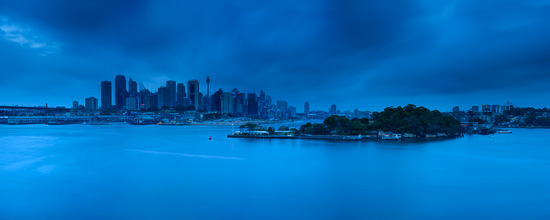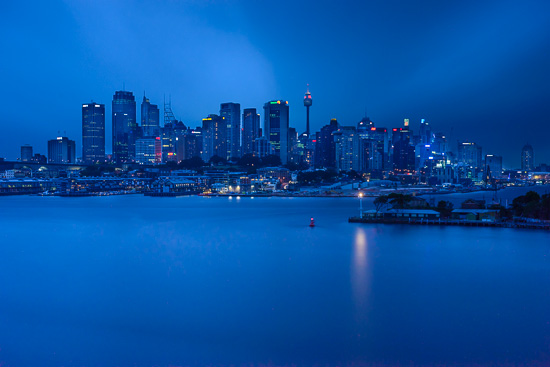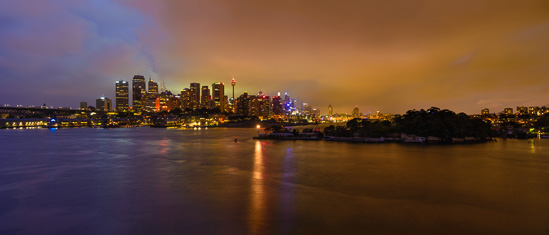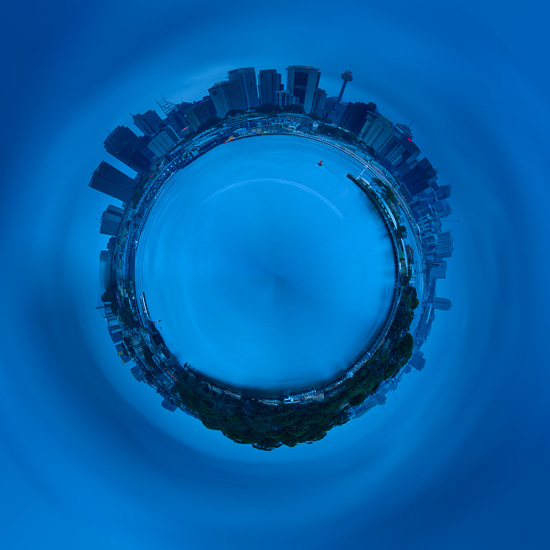Sydney on Ice Panoramas…
by Rodney Campbell on Feb.08, 2014, under Life, Photography
Went for a quick visit to nearby Balls Head on Sydney Harbour for a potential sunset session overlooking Sydney city. Balls Head Reserve is a lovely finger of land jutting into the harbour on the northern side (and to the west of the Sydney Harbour bridge) which has a great high view right across the harbour to the Sydney CBD.
I’ve shot from here before but almost always with a wide or very wide lens (it has sweeping views from the harbour bridge to the east around through the city and past Anzac bridge to Balmain to the west. This time I wanted to try some longer focal length stitched panoramas.
Note: These photographs (especially the wider shots) look much better when larger – so click any of the images below to see larger versions in an inline overlay slideshow gallery viewer.
It was a very grey old evening so sunset was looking to be a bust but I was experimenting so…
First up we tried another BigStopper long exposure panorama shot with my 24-70 at 70mm – 5 frames with the Lee BigStopper stacked with a Lee 0.6 ND Grad and each 62 seconds at f/8 and ISO 200, daylight white balance started about half an hour before sunset
The Ice Age
For comparison this is a single horizontal frame shot at 56mm (646 seconds at f/8 and ISO 400)
Ice City
Teaching Point: Don’t just think of using a wide lens for Panoramas
Especially with beginning photographers it’s very tempting to use the widest focal length you can when making stitched panoramas – it makes sense – you’re already trying to convey this massive wide view and so you use the widest lens you can and start rotating through the frames for the panorama sequence. The wider the lens the less frames you need to take to cover the width of the scene and after being stitched the height and width of the resulting panorama has good proportions (i.e. you can end up with a nice 2:1, 3:1 or 4:1 aspect ratio even with really wide angles of view (180˚+))
Sometimes however a longer focal length provides a much better result and here is why:
– if the things you are shooting are quite far away (e.g. the stretch of city on the horizon) then a longer focal length will give it much more prominence in the frame – if you use a wide focal length it’s just a tiny hidden ribbon in the resulting pano
– if there’s a lot of sky and not much at the bottom then if you use a wide lens then the interesting part is a tiny ribbon across the middle of the pano lost in a sea of nothing at the top and bottom – using a longer focal length means theres much less sky at the top and land/water/whatever at the bottom
After sunset we waited for it to get dark enough for the city lights to come on, some light pollution to fill some of those dense clouds and a bit of twilight colour to filter in
25 minutes past sunset, 8 frames at 70mm again, the light levels weren’t even across the frame so I manually adjusted the exposures on the way around – ranged from 25 seconds at f/9 to 20 seconds at f/10
Storm’s Comin’
This one was the widest of the night – half an hour after sunset and we were getting this massive green glow above the heart of the city – I’m not exactly sure what from but I’m speculating from the day/night cricket match at the SCG
Green with Envy
and for kicks here is the panosphere (tiny planet) version of The Ice Age
The Ice Age – Panosphere











